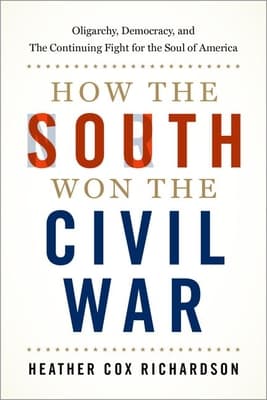
Book Review Summary: How the South Won the Civil War: Oligarchy, Democracy, and the Continuing Fight for the Soul of America
Introduction
"How the South Won the Civil War: Oligarchy, Democracy, and the Continuing Fight for the Soul of America" by Heather Cox Richardson is a provocative work that challenges the conventional narrative of the Civil War. Richardson argues that while the North prevailed in the conflict, the system that sustained the defeated South moved westward and established a foothold. This book examines the story of the American paradox, exploring how racial hierarchies and oligarchic power structures have persisted in the United States. It offers a searing critique of the modern conservative movement and its roots in the ideology of the Confederacy.
About Heather Cox Richardson
Heather Cox Richardson is an accomplished historian and author known for her insightful analysis of American politics and history. With a background in political science and a passion for storytelling, Richardson brings a unique perspective to her work. Her previous books, including "The Death of Reconstruction" and "To Make Men Free," have garnered critical acclaim for their depth of research and engaging writing style.
Analysis of Views
- The Ideology of the Old South: Many readers praise Richardson's ability to connect the ideology of the Confederacy to contemporary conservatism. They argue that the book debunks the myth that the Civil War released the nation from oligarchy and exposes how the Old South not only survived but thrived in the West.
- The Cowboy Myth: Readers appreciate Richardson's exploration of the cowboy myth as a symbol of individualism and self-reliance in American culture. They find her analysis of how this myth interacted with extractive industries and racial hierarchies to reinforce oligarchic power structures thought-provoking.
- The Continuing Struggle for Equality: Several readers emphasize the relevance of Richardson's book to contemporary political issues. They argue that her examination of how oligarchic power structures have persisted in American society highlights the ongoing fight for equality and democracy.
- A Compelling Argument: Many readers find Richardson's argument persuasive and well-supported by historical evidence. They appreciate her ability to draw connections between past and present, providing a comprehensive understanding of the complexities of American politics.
- Engaging Writing Style: Several readers commend Richardson's writing style, describing it as accessible, engaging, and well-researched. They appreciate her ability to convey complex ideas in a clear and concise manner, making the book enjoyable to read despite its challenging subject matter.
Reasons for Recommendation
- Provocative Thesis: Readers recommend this book for its provocative thesis, which challenges conventional narratives about the Civil War and its aftermath. They find Richardson's exploration of how oligarchic power structures have persisted in American society thought-provoking and relevant to contemporary politics.
- In-Depth Historical Analysis: Many readers recommend this book for its thorough historical analysis. They appreciate Richardson's ability to draw connections between past and present, providing a comprehensive understanding of the complexities of American politics and society.
- Engaging Writing Style: The engaging writing style of Heather Cox Richardson is a key reason why readers recommend this book. They appreciate her ability to convey complex ideas in a clear and concise manner, making it accessible and enjoyable to read despite its challenging subject matter.
- Relevance to Contemporary Issues: The relevance of Richardson's book to contemporary political issues is another reason why readers recommend it. They find her examination of how oligarchic power structures have persisted in American society highlights the ongoing fight for equality and democracy, making it a valuable read for anyone interested in understanding American politics.
Reasons for Not Recommendation
- Limited Focus on Reconstruction: Some readers feel that the book places too much emphasis on post-Civil War developments and does not adequately explore Reconstruction era politics and society. They argue that a more comprehensive exploration of this period would provide a more complete understanding of American history.
- Overemphasis on Symbolism: A few readers feel that Richardson overemphasizes symbolism in her analysis, such as the cowboy myth, at the expense of more concrete historical evidence. They argue that while symbolism can be insightful, it should not be used as the sole basis for drawing connections between past and present events.
- Challenging Subject Matter: Some readers find the subject matter challenging and feel that it requires a significant investment of time and effort to fully understand. They appreciate the depth of research and analysis presented in the book but acknowledge that it may not be suitable for readers seeking a more accessible introduction to American history.